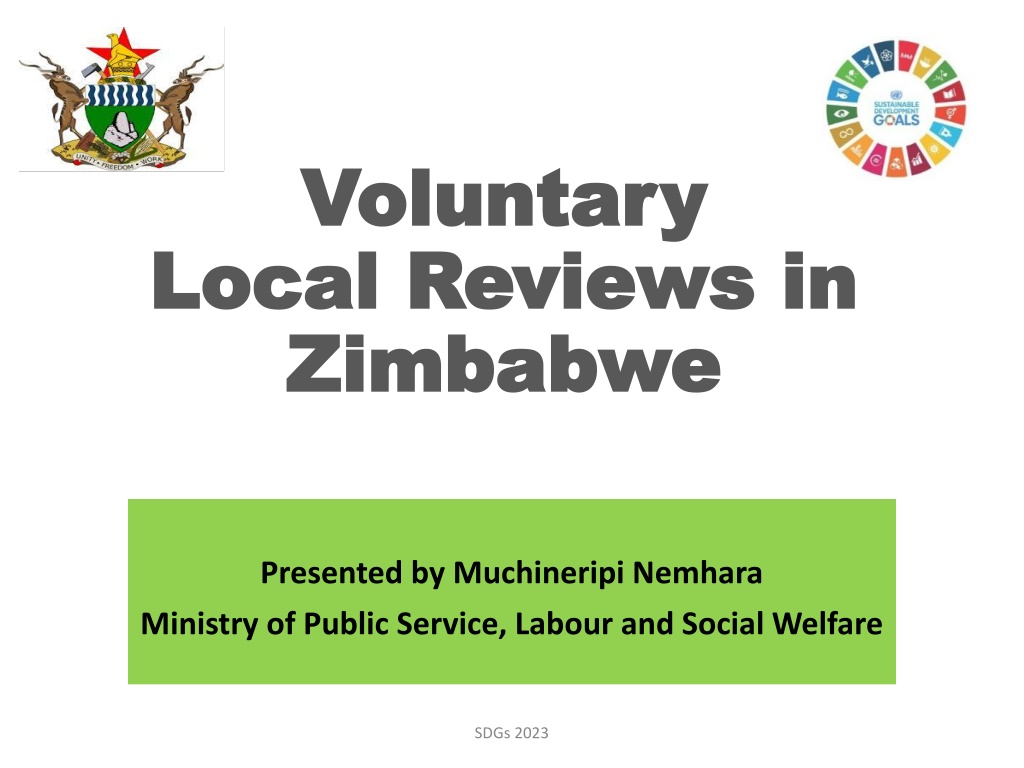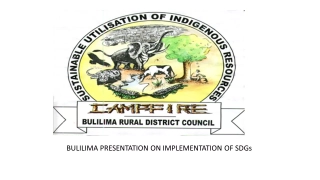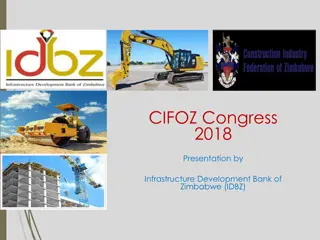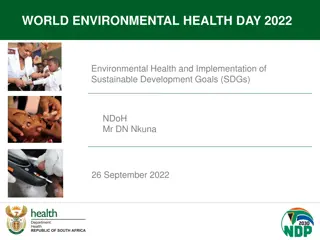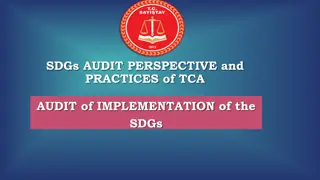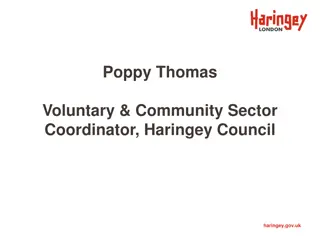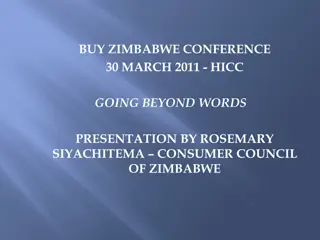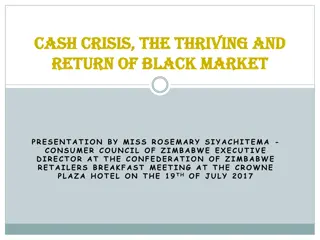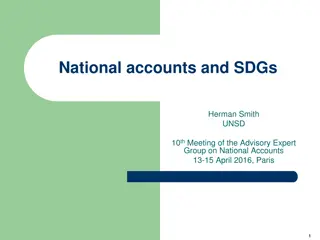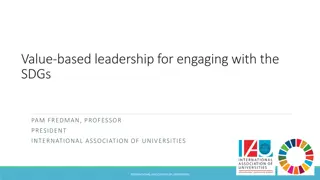Voluntary Local Reviews in Zimbabwe: Strengthening SDGs 2023 Implementation
Voluntary Local Reviews (VLRs) in Zimbabwe are crucial for monitoring progress in SDGs 2023 implementation. These reviews involve local authorities voluntarily assessing progress, sharing experiences, and fostering inclusiveness. VLRs serve as a platform for localizing the Sustainable Development Goals (SDGs) and encouraging community involvement. The Ministry of Public Service, Labour, and Social Welfare is spearheading the VLR process in collaboration with the United Nations system. Lessons learned from pilot VLRs highlight strides made in integrating the 2030 Agenda into local strategies.
Download Presentation

Please find below an Image/Link to download the presentation.
The content on the website is provided AS IS for your information and personal use only. It may not be sold, licensed, or shared on other websites without obtaining consent from the author. Download presentation by click this link. If you encounter any issues during the download, it is possible that the publisher has removed the file from their server.
E N D
Presentation Transcript
Voluntary Voluntary Local Reviews in Local Reviews in Zimbabwe Zimbabwe Presented by Muchineripi Nemhara Ministry of Public Service, Labour and Social Welfare SDGs 2023
Introduction Introduction Voluntary Local Review is a process in which local authorities voluntarily review progress and follow- up on the implementation of the 2030 Agenda. A vehicle for sharing experiences, challenges and lessons learnt. Open avenues for new partnerships. VLRs communities thereby strengthening accountability and inclusiveness of policymaking process. enables local authorities to engage SDGs 2023
The purpose of VLRs is to monitor progress in SDG implementation as well as to share experiences, successes, challenges and possible solutions, with a view to accelerating the implementation of the 2030 Agenda. VLRs leverage on resources availability at community level and showcasing how communities are contributing to the achievement of Sustainable Development Goals. They provide a platform for localizing SDGs, an opportunity for stakeholders to contribute to development and enable sharing of experiences and best practices Localizing the Sustainable Development Goals (SDGs) entails integrating them in the design, implementation and monitoring of sub-national plans and putting sub-national governments at the centre of the SDGs SDGs 2023
Voluntary Local Review in Zimbabwe SDGs 2023 4
Progress on VLRs Progress on VLRs 2 pilot Voluntary Local Reviews were conducted for Harare City and Victoria Falls Town in 2020. In 2023, 4 VLRs were undertaken for Bulawayo City, Zvishavane Town, Bikita Rural and Mutasa Rural. Plans are underway to cascade VLRs to all local authorities. SDGs2023
Progress on VLRs Progress on VLRs The VLR process is being led by the Ministry of Public service, Labour and Social Welfare in collaboration with the Government and Public Works. Ministry of Local VLRs are being conducted with support from the United Nations system, particularly UNDESA, UNRCO, UNDP, ECA, IOM among others. SDGs2023
Lessons learnt from the Pilot VLRs Local authorities have integrated the 2030 Agenda in their Strategic Plans. Prior to the Covid-19 Pandemic, remarkable progress had been made at local level mainly in SDGs 3, 4, 6, 9 and 11: Various initiatives to include the marginalized /disadvantaged communities in development planning and implementation. Prioritization of SDGs ( SDG 2 End hunger, SDG 3 Good health and wellbeing, SDG 4 Quality education, SD 6 Clean water and sanitation and SDG 5 Gender equality). SDGs2023
Lessons learnt from the Pilot VLRs Institutions to coordinate SDGs implementation were put in place. Collaboration with development partners especially in areas of health, education, the environment and civil protection. Local leadership plays a key role in coordinating SDGs and national development plans. For RDCs - village development committees and ward development committees. SDGs2023
Lessons learnt from the Pilot VLRs Facilitated peer-to-peer learning among local authorities Promote accountability to citizens. Reflected initiatives being implemented to foster development at local levels while considering the three aspects of sustainable development that are social, economic, and environmental Provided a knowledge repository and a framework that can be used to cascade the VLRs to other local authorities. SDGs2023
Lessons learnt from the Pilot VLRs VLRs increases public awareness, knowledge and perceptions of SDGs communities and citizens to take action in their own local communities. and empower local The Devolution agenda will accelerate sustainable development and enables communities to directly benefit from resource endowments within their local communities. SDGs2023
BENEFITS OF VLRS BENEFITS OF VLRS VLRs provides a clear roadmap for more balanced and equitable development. VLRs provides a platform for localizing SDGs. Provides an opportunity for stakeholders (private sector, civil society, academia, residents, etc) to contribute to national development. Enables sharing of experiences and best practices. Enhance awareness of SDGs and national development plans at local level. SDGs2023
Benefits of VLRs Benefits of VLRs Enables people centered decision making that is more relevant to address problems being faced at the local level. Vehicle to initiate local action, and people action that is required for the acceleration of SDGs implementation. VLRs reflect real progress being made in attaining SDGs since they are done at local level. Can be utilized by policy makers to inform evidence- based development plans and interventions. SDGs2023
KEY MESSAGES FROM VLRS KEY MESSAGES FROM VLRS 1. Financing Various financing mechanisms (Strengthening domestic resource mobilization is key). 2. Institutional and Policy Reforms - Creation and institutionalization of inter-agency steering committees on sustainable development supports the coordination of efforts toward the implementation, monitoring, and reporting on sustainable development progress. 3. Capacity Building - Capacity building of local authorities should be prioritized. 4. Multi-Level Partnerships - Horizontal and vertical partnerships for sustainable development initiatives. The local authorities need to establish mechanisms for SDGs peer-review to strengthen the learning around best practices on SDGs implementation, monitoring, and reporting. SDGs2023
OPPORTUNITIES FOR IMPROVEMENT OPPORTUNITIES FOR IMPROVEMENT Lack of disaggregated localized data - Local authorities are facing limitations on data availability. Domestic Resource Mobilisation - CSOs, private sector and other stakeholders are major players in resource mobilization for capital and humanitarian projects. Alignment synchronization of the local monitoring and evaluation systems with SDG targets and indicators as central to tracking progress and reporting on SDGs implementation. of M&E Systems - Alignment and Awareness Raising - Raising public awareness of the 2030 Agenda and Agenda 2063 should be supported. SDGs2023
The SDGs must be fully integrated and mainstreamed into local authorities development plans and strategies. Climate change is affecting Accelerated uptake of climate proofing agriculture should be considered. PPPPs should be supported. Elaborate framework on how VLRs will be integrated into Voluntary National Reviews. food production. SDGs2023
Thank you SDGs2023
